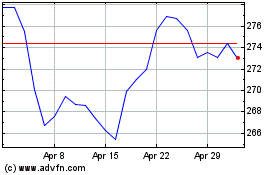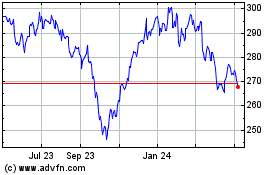McDonald's Avoids Fines as Europe Rules Its Tax Deal Is Legal--Update
September 19 2018 - 10:36AM
Dow Jones News
By Emre Peker
BRUSSELS -- European Union regulators said Wednesday that
McDonald's Corp.'s tax arrangement in Luxembourg is legal, dropping
an investigation against the U.S. fast-food giant while lauding
efforts to close tax loopholes in the probe's wake.
The closure contrasts with a slew of fines and tax bills slapped
on other American companies, particularly tech giants. President
Trump and his predecessor, Barack Obama, have accused the EU of
unfairly punishing U.S. firms with antitrust and tax cases.
European Competition Commissioner Margrethe Vestager said the
investigation showed the EU acts objectively.
"The good thing about this outcome is of course that it's a case
that proves that we don't see state-aid where there is no
state-aid," Ms. Vestager said.
Rather than state-aid, the commission found tax loopholes that
had allowed a McDonald's franchising unit to avoid paying taxes on
either side of the Atlantic. Ms. Vestager said Luxembourg's
treatment of McDonald's defies tax fairness but doesn't amount to a
special deal because it is in line with a U.S.-Luxembourg
double-taxation treaty. Luxembourg is now changing its domestic tax
laws to close loopholes.
Mr. Trump had previously complained that Ms. Vestager "really
hates the U.S." and that as the EU's "tax lady" she was going after
American companies. In 2015, Mr. Obama said EU probes were driven
by commercial interests to help European firms compete with U.S.
tech giants. Ms. Vestager and EU officials deny the
allegations.
In a sign that the EU would continue aggressively with antitrust
investigations, Ms. Vestager confirmed Wednesday that Brussels had
initiated a preliminary probe into Amazon.com Inc.'s business
practices.
"We are gathering information," she said. "These are very early
days. We have no conclusions. We haven't formally opened a
case."
Last October, Ms. Vestager slapped the U.S. online-retailing
behemoth with a tax bill of more than EUR260 million ($304
million), saying its arrangement with Luxembourg is illegal.
The European Commission, the EU's executive arm and antitrust
authority, has repeatedly targeted Luxembourg's tax practices. In
2016, Ms. Vestager ordered the country to recoup EUR23.1 million in
back-taxes from Fiat Chrysler Automobiles NV, which prompted
Luxembourg to tighten its tax laws.
Luxembourg introduced an amendment over the summer to close a
loophole that allows for double non-taxation of companies, as in
the McDonald's case.
Under international tax rules, companies and individuals with
footprints in multiple jurisdictions are generally taxed in one of
them and, where double-taxation treaties exist, other relevant
jurisdictions accept that taxes have been paid. Playing off
technicalities and loopholes between jurisdictions where a company
operates to avoid taxes altogether is generally not permitted.
Ms. Vestager welcomed Luxembourg's shift.
"Over the past few years, we have seen an international
determination to deal with the issue of tax avoidance," Ms.
Vestager said. "Member states take responsibility themselves to say
'Well, this should not be the way for the future.'"
The decision to drop the case against McDonald's comes on the
heels of massive tax fines as the EU cracked down on sweetheart
deals in member states including Belgium, Ireland, Luxembourg and
the Netherlands. The commission is also investigating a U.K. tax
scheme for multinationals and the Dutch treatment of Swedish
furniture giant IKEA.
"We welcome the European Commission's decision," McDonald's
spokesman Sanjay Misty said in an email.
McDonald's companies paid more than $3 billion in corporate
income taxes in the EU from 2013-2017, he said. Mr. Mistry declined
to comment on the potential impact of Luxembourg's proposed
amendment, which would require McDonald's and similarly situated
companies to certify the existence of a taxable entity in another
country.
In 2016, the commission slapped Apple Inc. with a bill for more
than EUR13 billion in Irish back-taxes, and last year referred
Ireland to the EU's top court for failing to recover illegal
benefits from Apple.
Ireland's Finance Minister Paschal Donohoe said Tuesday that
Dublin had fully recovered EUR14.3 billion in alleged state-aid,
plus interest, from Apple. The money has been deposited into an
escrow account pending Ireland's appeal of the EU tax decision.
Since October 2015, Brussels has also targeted Starbucks Corp.'s
tax deal with the Netherlands, ordered Belgium to recoup about
EUR900 million from 35 mostly European companies and slapped French
utility Engie SA with a EUR120 million bill for undue tax benefits
granted by Luxembourg.
"These are important steps forward to tackling multinationals'
tax avoidance and to meeting our ultimate goal of ensuring that all
companies, big or small, pay their fair share of tax in the
future," Ms. Vestager said.
Write to Emre Peker at emre.peker@wsj.com
(END) Dow Jones Newswires
September 19, 2018 10:21 ET (14:21 GMT)
Copyright (c) 2018 Dow Jones & Company, Inc.
McDonalds (NYSE:MCD)
Historical Stock Chart
From Mar 2024 to Apr 2024

McDonalds (NYSE:MCD)
Historical Stock Chart
From Apr 2023 to Apr 2024
